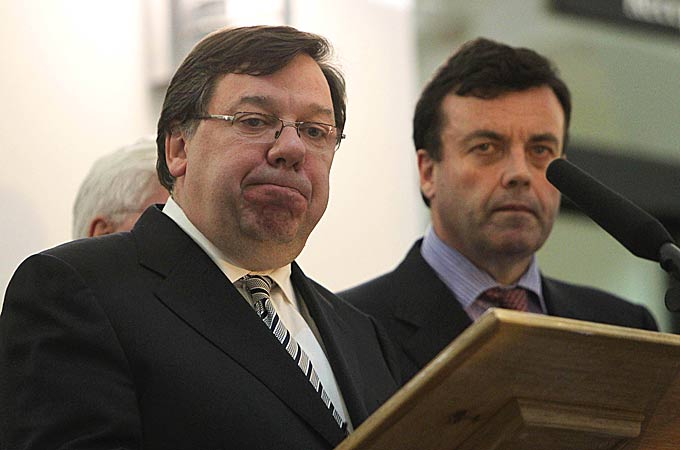Irish PM to remain party leader
Brian Cowen says he will not resign as head of Fianna Fail party but offers colleagues secret ballot on his leadership.

 |
| Several Fianna Fail politicians have called for Cowen to step down as leader following Ireland’s financial crisis [AFP] |
Brian Cowen, the Irish prime minister, has said he will not resign as head of the ruling Fianna Fail party, but has offered his colleagues the chance to vote on his leadership in a secret ballot later this week.
Several Fianna Fail backbenchers have called for Cowen to step down after Ireland was forced to seek an international financial bail-out late last year.
Keep reading
list of 4 items‘We need you’: Solomon Islands’ support for US agency’s return revealed
Why are nations racing to buy weapons?
Parallel economy: How Russia is defying the West’s boycott
Speaking at a news conference in Dublin on Sunday, Cowen said: “We will put a motion to the party on Tuesday and we will unite behind that decision.”
Cowen, who said he was confident of victory, said he was not willing to wait indefinitely for one or more of his cabinet colleagues to mount a direct challenge to oust him.
Michael Martin, the foreign minister and favourite to replace Cowen, Brian Lenihan, the finance minister, and Mary Hanafin, the tourism minister, have all said they would like to lead the party if a vacancy arises.
Many analysts believe Cowen’s decision, following days of talks with parliamentarians, is merely a stay of execution in the run-up to a general election – likely to be held in March – that is expected to result in a heavy defeat for him and his government.
‘Absolute humiliation’
Speaking to Al Jazeera from Dublin, Ken Murray, a political journalist, said: “The arrival of the International Monetary Fund and the European Central Bank last month to effectively bail out the Irish economy was seen by many here as an absolute humiliation.
“The demise of his [Cowen’s] Fianna Fail ruling party in the opinion polls from a high of 41 per cent in 2007 to a current low of 14 per cent has made many people feel that Brian Cowen, if you like, is not the man to lead Fianna Fail into the next general election.”
Cowen rose to power in 2008 as Ireland’s 13-year Celtic Tiger economic boom was giving way to a property-market implosion and banking crisis.
He has faced rising accusations in recent weeks of making decisions that benefited bankers far more than taxpayers, who have been burdened with a bank-rescue bill expected to top $65bn.
The pressure for Cowen’s removal flared last week when a new book revealed that Cowen held several dinners and social events, including a daylong golf outing, with top bankers in the weeks before his government decided to insure all of the borrowings of Dublin banks – an internationally unprecedented move at the time.